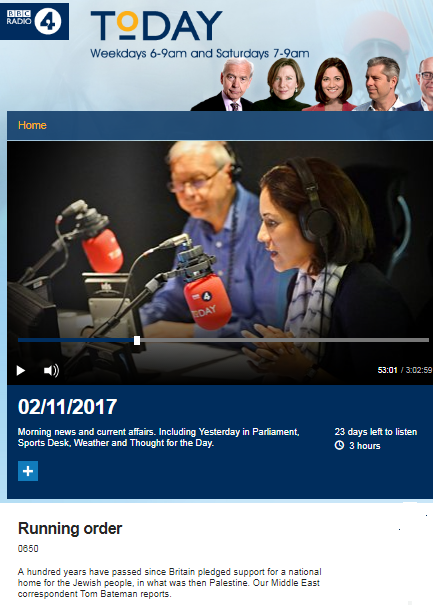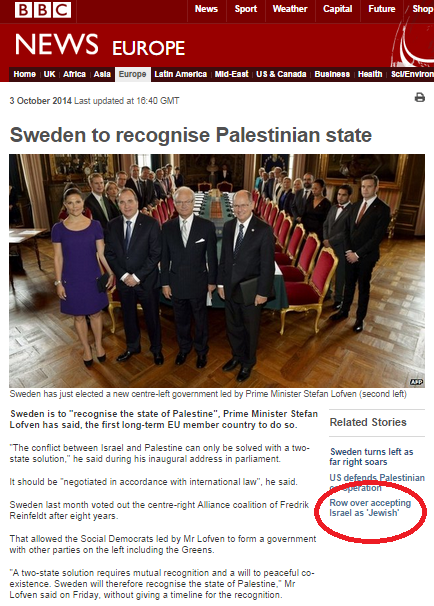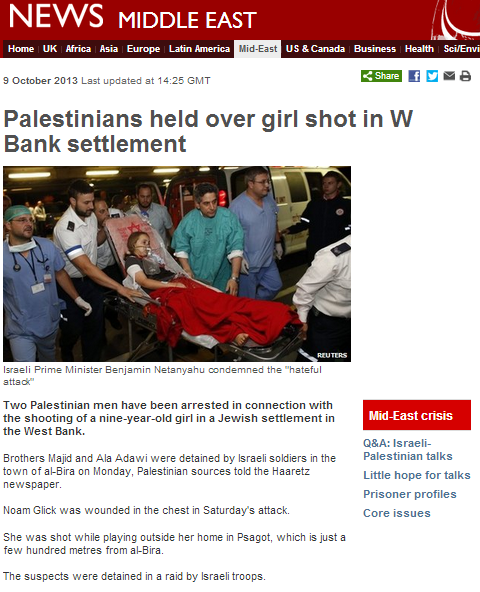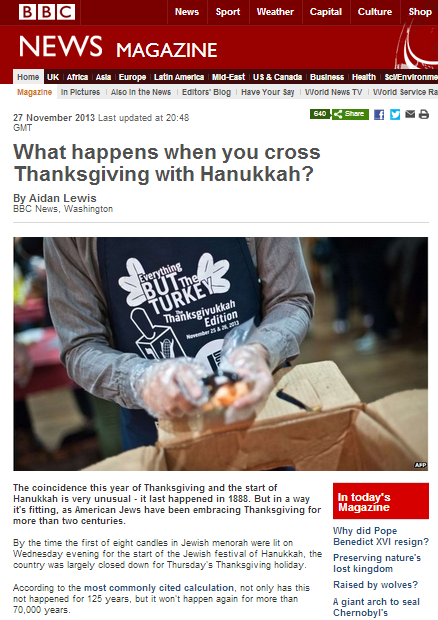The third item (see the first here and the second here) relating to the Balfour Declaration centenary that was aired on the November 2nd edition of BBC Radio 4’s flagship news and current affairs show ‘Today‘ was an interview (from 01:32:28 here) with Israeli deputy minister Tzipi Hotovely conducted by the programme’s co-presenter Nick Robinson.
[emphasis in italics in the original, emphasis in bold added]
Robinson: “Benjamin Netanyahu will visit Downing Street today. The Israeli prime minister’s official residence back home is known simply as ‘Balfour Street’. That name: a recognition of the role of the British foreign secretary Arthur Balfour who, a hundred years ago today, declared Britain’s support for a Jewish homeland in the Holy Land. I’ve been speaking to Israel’s top diplomat – deputy foreign minister Zipi [sic] Hotovely about the significance of this day.”
After listeners heard Hotovely describe the Balfour Declaration as the beginning of international recognition of the Jewish right to self-determination and its wording as “very precise” in stating that the Jewish people should have their homeland, Robinson stepped in with yet more inaccurate paraphrasing of its text.
As was the case in the previous two items in this programme as well as in many additional BBC reports on the same topic (see ‘related articles’ below), he erased the all-important words “civil and religious” from his portrayal of the statement “nothing shall be done which may prejudice the civil and religious rights of existing non-Jewish communities in Palestine”.
Robinson: “It was precise in another way though, wasn’t it? The second half of what’s called the Balfour Declaration said nothing shall be done which prejudices the rights of the people already living in that area. That is unfinished business, is it not?”
Hotevely replied by clarifying that all Israeli citizens have equal rights and quoting the Declaration of Independence on that point. Robinson interrupted:
Robinson: “Those are the people living in Israel proper but of course there are many people living under Israeli occupation on what the world refers to as the occupied West Bank. They do not have equal rights, do they?”
At no point throughout this item were listeners informed that the people to whom Robinson refers are not Israeli citizens and that vast majority of Palestinians living in Judea & Samaria do so under the rule of the Palestinian Authority in Areas A and B as defined under the terms of the Oslo Accords.
While Hotovely was answering that question, Robinson – adopting an increasingly aggressive and patronising tone – interrupted her again:
Robinson: “Let’s be clear: when you deny the notion of occupation you are denying something recognised by every government round the world. You are denying something recognised by the United Nations, which all say that Israel is occupying land after the 1967 war and there should be the prospect at least of a Palestinian state there.”
As Hotovely tried to point out that the Palestinians rejected the 1947 Partition Plan, Robinson interrupted her again:
Robinson: “Yeah but we’re talking about your idea. You’re saying that it is not occupied. In what sense…well forgive me…let’s deal with what you said. In what sense is it not occupied?”
Hotovely’s response referring to the ancient Jewish connections to Judea & Samaria and Jerusalem was again interrupted by Robinson:
Robinson: “Well let’s go back to Balfour. Let’s go back to what he said. […]
Nobody said that Jews don’t have a connection with them. The land is occupied after a war. Now Balfour; let’s go back to him.”
Hotovely appears to have tried to raise the topic of the Six Day War at that point but Robinson interrupted her again with an even more inaccurate paraphrasing of the declaration’s text.
Robinson: “Forgive me. Let’s go back to Balfour. The Balfour [sic] said nothing should be done which prejudices the rights of the Palestinian people. Now you’ve got children. Imagine they were Palestinians living on what the world refers to as the occupied West Bank. Are you really saying that they would have the same rights as your children have?”
Just a few words into her reply, Robinson yet again interrupted:
Robinson: “That wasn’t the question.”
When Hotovely raised the point that there is no occupation or settlements or Israeli troops in the Gaza Strip and that the area is nevertheless under the control of a terrorist organisation, Robinson interrupted once more.
Robinson: “OK. Let me go back to Balfour one more time if I could. The British government said […] OK; so the British government…it is the British government’s position that there is unfinished business in the Balfour Declaration. Your prime minister is in the UK today and will be celebrating the Balfour Declaration. It is the British government’s position that only half of Balfour has been delivered. Let me just put the same question to you again. You have children. Imagine they were Palestinians living in the occupied West Bank. Would they have the same rights was my question. And the answer – you know – is no, they would not.”
Hotovely then spoke about Palestinian incitement and “schools and squares” named after terrorists that glorify violence against Jews but was again interrupted.
Robinson: “Well as you know there are many children who don’t believe that and many schools that don’t teach it. Let’s talk about the future if we could, minister, because that’s what matters now.”
Hotovely’s response to that interruption included the observation “it doesn’t seem like you’re shocked from [by] the idea that young children are being raised on this legacy of terrorism” but Robinson continued with yet another ‘question’ to which he also provided the answer.
Robinson: “Has Israel now abandoned the goal set by so many of a so-called two-state solution? In other words; of Israel living alongside and in peace with a Palestinian state. From everything you say, you have.”
Hotovely’s attempts to reply were repeatedly interrupted.
Robinson: “What’s your policy though? What’s your policy?”
Robinson: “So there will be no Palestinian state?”
Robinson: “Let me ask what you think the future is rather than your view of the Palestinians. Is your view of the future then a larger Israel incorporating what you call Judea & Samaria – what other people call the occupied West Bank – with second class Palestinian citizens live [sic] there? Is that your vision?”
After Hotovely’s reply to that question (and without it being clarified to listeners that her personal political views on that topic are not the majority view in Israel) Robinson continued by asking whether her three year-old and one year-old daughters have “Palestinian friends”:
Robinson: “Well let me ask you finally and personally – do you, do your family, do your children have Palestinian friends?”
Hotovely managed to say that her brothers live in Judea & Samaria and use the same facilities as Palestinians before Robinson interrupted yet again:
Robinson: “They have friends?” […]
He then proceeded to lecture his guest.
Robinson: “Well going to a Palestinian shop is not the same as having friends. The reason I ask you the question is peace needs hope. What the Balfour Declaration did was to give the Jewish people hope. What hope are you offering to the Palestinian people?”
One cannot but arrive at the conclusion that the sole aim of this aggressive, patronising and ultimately tediously uninformative interview was to amplify yet again the BBC’s chosen political message that the Balfour Declaration is ‘unfinished business’ by means of inaccurate representation of its text.
Related Articles:
BBC’s Bateman amplifies PLO’s Balfour agitprop
More Balfour Declaration agitprop promotion on the BBC News website
BBC News portrays propaganda installation as a “museum”
BBC report on UK Balfour dinner follows standard formula
More BBC Balfour Declaration centenary reporting from Yolande Knell – part one
More BBC Balfour Declaration centenary reporting from Yolande Knell – part two
BBC Radio 4’s ‘Today’ Balfour Declaration centenary special – part one
BBC Radio 4’s ‘Today’ Balfour Declaration centenary special – part two




